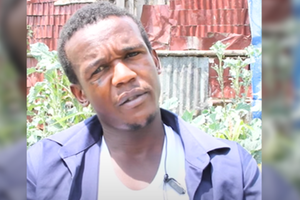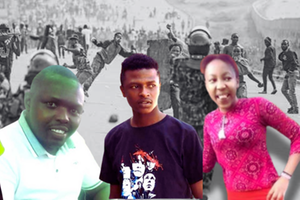
Ann Wanjira holds a portrait picture of her late son Evans Kiratu, Ibrahim Wanjiku Kamau, Charles Owino and Kevin Odhiambo. Background: Edith Wanjiku (left) and a friend react at City Mortuary in Nairobi on June 26, 2024, after viewing the body of her son Ibrahim Kamau.
Over a month after their children were felled by police bullets during anti-Finance Bill 2024 protests, families that lost their loved ones are now worried that they may never get justice.
With forlorn faces, more than 10 families on Wednesday recorded statements with the Independent Policing Oversight Authority (Ipoa) in Nairobi.
They want the civilian-led police watchdog to investigate the conduct of the police officers accused of killing their children, and ensure those culpable are arrested and sentenced for the crimes they committed.
But this plan, they said, might be but a pipe dream. One impediment stands in their way: getting witnesses to testify in court.
Thus far, very few witnesses have shown up out of fear of reprisal with the bereft parents and relatives calling on the Witness Protection Agency to assure the witnesses’ safety.
As if proving their desperation, Ipoa chairperson, Anne Makori, appealed to the public who witnessed the incidents leading to the deaths of several Kenyans during the protests to step forward.

Edith Wanjiku, Johnstone Mutisya and Karobia Kiratu hold portrait photos of their loved ones who were killed in the anti-government protest, at IPOA Offices in Nairobi on July 31, 2024.
Still in mourning, here is what the bereaved family members said about their lost loved ones:
Kennedy Njeru, 19
Kennedy died on June 25, 2024, shortly after the protestors gained entry to Parliament. He was shot in the head.
His father, Joseph Mwangi, is yet to come to terms with his son’s death. He even gets sadder when he recalls that his son’s first salary, which should have been used to assist the family, was tragically used to buy the coffin and pay for the travel expenses for the teenager’s final send-off.
“I had done everything to secure Njeru’s employment. He was my hope for a brighter future. He never even saw his first salary of Sh30,000. By the time it hit his account, he was dead already,” Mr Mwangi said.
To date, he is yet to find a witness to testify or even record a statement of what happened. Fear, he said, is preventing anyone from showing up to assist the family.
“Does this mean that our children’s death will go unpunished? That we will never find justice, simply because we cannot trace witnesses? Where do we get the witnesses from? The State must find another way to mete out justice,” he said.

Police officers arresting a relative to the late Evans Kiratu along Kenyatta Avenue in Nairobi on July 25, 2024, while holding a portrait picture of Evans during an anti-government protest.
Evans Kiratu, 21
He succumbed to injuries after being struck by a teargas canister allegedly fired by the police on June 19, 2024.
His death was the second one to be recorded in the Gen Z protests after that of Rex Masai, another protester who was shot dead along Mama Ngina Street.
His father, Kiratu Karobia, said he was very concerned that the family found a witness willing to appear in court but whose protection is not yet guaranteed, something that might affect their case in court.
The deceased’s case is the only one, out of the four submitted by Ipoa to the Office of the Director of Public Prosecution (ODPP) that is being processed to go to court. The other three files were returned to the authority by the prosecution.
“The ODPP is saying witnesses are not enough, but we know they are there but have a lot of fear. Their safety should be guaranteed first. The Gen Zs were fighting for justice and it is right within their democratic right," he said.
Erickson Kyalo Mutisya
Erickson died on June 25, 2024, when the anti-Finance Bill protestors gained access to the Parliament. He was the youth seen in a white overall dancing outside parliament’s perimeter wall but was a few minutes later found dead after a bullet fired by officers protecting the August House tore through his head.
For his father, Johnstone Mutisya, the bullets that were recovered from his son’s body should assist the ballistics and forensics experts to finger the culprit who snuffed out the life of his unarmed son.
The findings from the analysis done on the bullet, he said, should be used to track down and bring the officer to justice.
“My son was shot in the head and died on the spot. His body was wrapped in a Kenyan flag. He was our family’s breadwinner making a living from his butchery. I was in the village when I heard of his death. Now where will I find witnesses to speak for my son?” he posed.

Edith Wanjiku (left) and a friend react at City Mortuary in Nairobi on June 26, 2024, after viewing the body of her son Ibrahim Kamau who was shot dead by police officers at Parliament buildings on Tuesday 25, during the anti-finance bill 2024 protests.
Ibrahim Kamau Wanjiku, 19
He died on June 25, 2024. His life was cut short by two gunshot wounds to his neck that were sustained during Kenya’s deadly anti-Finance Bill protests dubbed -Occupy Parliament.
His mother, Edith Wanjiku, says she does not trust the police will do a good job in finding who squeezed the trigger of the gun resulting in her teenage son’s death.
“I have lost all faith in the police and that is why we, parents, are here at Ipoa to find a better solution. We do not want this case to take forever. These cases should in fact take less than a year. We want justice,” she said.

The late Ibrahim Wanjiku Kamau's potrait pictured at IPOA Offices in Nairobi on July 31, 2024.
The fact that an autopsy of Ibrahim’s body confirmed that he died from excessive bleeding caused by bullet wounds, yet the bullets were not found on his body, is a sign that the alleged officers who committed the crime were keen on hiding their tracks.
“How will we find witnesses yet some of these plainclothes officers who shot our children had silencers in their guns? How can the other protestors even know who shot at them when they did not even hear some of the gunshots? We want answers,” she said.
Kennedy Odhiambo, 12
Kennedy died on the evening of June 25, 2024, after leaving his home in Rongai and heading to borrow a book from his classmate who lived nearby.
Unfortunately, the young boy did not make it back home after a bullet tore through his shoulders, resulting in a heavy haemorrhage that led to his untimely demise.
Postmortem examination showed that he was shot once, and not eight times as had been alleged by Kenyans on social media.
Before his death, he had demonstrated the skills of a talented artist with a knack for drawing.
His aunt, Jennifer Odhiambo yesterday revealed that they are yet to bury the child due to some court issues.
“The young boy was not in the protests yet he was still shot at and died. It is very unfortunate. We want our cases completed in two or three months so that we sleep knowing we have justice,” she said.

George Oduor, a brother of 19-year-old late Charles Owino who was shot dead in Kitengela during anti-government protests, speaks at City Mortuary in Nairobi on July 17, 2024, after identifying the body.
Charles Owino, 19
He died during the anti-Finance Bill protests in Kibra. The bullet that tore through hit his head has never been found to date.
“His case might disappear because the bullet that killed him was not found during the post-mortem. Someone took it, we do not know who. So who can dare come and testify in court about what happened after seeing such brutality?” Linet Mboya, the deceased’s cousin posed at the Ipoa offices.
Ms Mboya wondered if the lack of witnesses and the bullet for forensic analysis meant justice had already eluded them.

The late 19-year-old Charles Owino was shot dead in Kitengela during anti-government protests.
Kevin Odhiambo, 16
The deceased died in Rongai while leaving school on June 25, 2024. His pockets had two things, a pen and a house key. He too was shot at, allegedly by police officers.
Phoebe Akinyi, his mother, said his late son had left school and was heading home hoping to find some materials he needed for his study. He was the head boy at his school.
“My son was a born leader. I am a poor woman and that charity school was what had schooled my boy since kindergarten. He was to do his KCSE exams this year and pursue a career in the electrical line. Now all his dreams are dead, just like him,” she said.

For Ms Akinyi, the State should do everything to get the officer who killed her son, she wants to look the officer in the eye and ask him/her why she/he decided to kill her promising son.
“Some of our police officers do not care. I want to know who killed my son. My days are filled with total darkness nowadays,” she said.
For Yusuf Aboubakar, an advocate and the executive director, Haki Africa, Ipoa and the State should not entirely rely on witnesses for their cases to be successful.
They can use indirect evidence, he said. This, he explained, will require ballistics and forensics analysis conducted on the bullets extracted from the bodies of the deceased and the results obtained used to trace the exact police officer who fired at the protestors.
“We expect nothing but justice from this entire exercise. Should this not happen, we will initiate private prosecutions because this bad habit of Kenyans being killed when fighting for their rights is a thing of the past,” he said.
Currently, Ipoa is investigating at least 41 deaths and 199 cases of injuries arising from the anti-Finance bill 2024.







